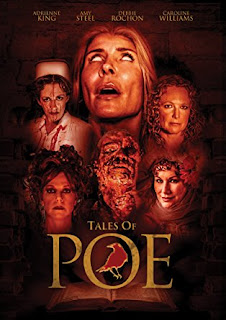The film is divided into three chapters, the first
chapter being “The Tell Tale Heart,” which stars Debbie Rochon as the Narrator
who tries to convince Evelyn (Lesleh Donaldson) of her sanity while describing
the murder she committed. Interestingly, the Narrator is locked in an asylum,
and we’ve already seen her splattered with blood, so there is little question
right from the beginning of her lunacy. When Evelyn, another inmate, asks her
why she’s there and tells her, “I bet you haven’t done half as much as what
I’ve done,” the Narrator begins to tell her story. And the film takes us to
the home of the old man from Poe’s short story, here an old woman (though
played by a man, Alan Rowe Kelly). And though the film shows us the story, we
still get voice over from the Narrator. There are some great shots in this
segment, as when the bell sounds from upstairs and the Narrator stops polishing
and simply turns her head toward the stairs. The look on Debbie Rochon’s face
is fantastic – dark, calculating, creepy. Because the Narrator is female in
this telling, the interaction with the policeman who shows up at the door takes
on a different tone. There is a vomit scene I could do without (it caught me by
surprise, the way the vomit scene in Fear And Loathing In Las Vegas
always does). Though obviously the filmmakers have a love for Poe, here they
allow the other patient to laugh and poke fun at the tale, perhaps providing a
voice for those who find the story unbelievable. “The cop didn’t smell her
dead body?” she says. “That is a pathetic, sad story.”
The Cask Of Amontillado, here titled simply “The
Cask,” is the second chapter of the film, and is somewhat different from the
short story. Here it is Fortunato’s new bride that turns on him, with the help
of a male friend, rather than just a male friend. Also, interestingly, Fortunato
(Randy Jones) appears to be a gay man who has somewhat unexpectedly decided to
marry a woman (though that woman is played by Alan Rowe Kelly), and the wedding
party pokes fun at this union. The exposition about the cask of priceless wine
is awkwardly introduced – a wedding guest says, “Fortunato, tell us more
about amontillado.” And then moments later she again says, “Fortunato,
tell us more.” Bad writing, and poor delivery. But this segment does get
better. Fortunato leads the wedding party into his own vault, where he says he
has a surprise for his bride. But she has a bigger surprise in store for him. I
love when she says, “This is the best part.” Delicious.
The third chapter, “Dreams,” is based on one of Edgar
Allan Poe’s poems. It begins with a close-up of a hand, and we hear the sounds
of hospital equipment before we see another pair of hands grasp that hand. The
woman on the hospital bed then begins to recite the poem in voice over: “Oh,
that my young life were a lasting dream…” This one is full of strange,
creepy imagery, and the entire thing has a dream-like atmosphere, with very
little dialogue. It’s more of a mood piece, the mood often being dark, with
different faces of death. It employs those dreadful feelings of isolation and
vulnerability one has when in a hospital bed, but also has moments of peace and
beauty. Some of the actors from the previous chapters appear in this story too,
which furthers the eerie dreamlike quality of the film. Though toward the end,
when a woman points and opens her mouth to let out a creepy scream, it’s right
out of the end of the 1978 remake of Invasion Of The Body Snatchers.
Special Features
The DVD contains several special features, including ten
minutes of behind-the-scenes footage and outtakes. There are also nine deleted
and extended scenes, including the old woman reading her fan mail in “The Tell
Tale Heart,” a shot of Debbie Rochon outside ignoring the woman’s bell, and
more of the wedding reception scene from “The Cask.” Most of the deleted
footage, however, is from “Dreams,” including scenes with Amy Steel watching
home movies, and a strange scene where the Dreamer is led to touch a wall and
disappear into it.
The special features also include an interview with Bart
Mastronardi from the New York City Horror Film Festival. He talks about their
strategy for getting people interested in the film, particularly their use of
social media. The interview is audio, during which we see still photos from the
production. This is approximately six minutes. The film’s trailer and
Kickstarter promotional spot are also included.
Tales Of Poe was released on DVD on October 11,
2016 through Wild Eye Releasing.





No comments:
Post a Comment